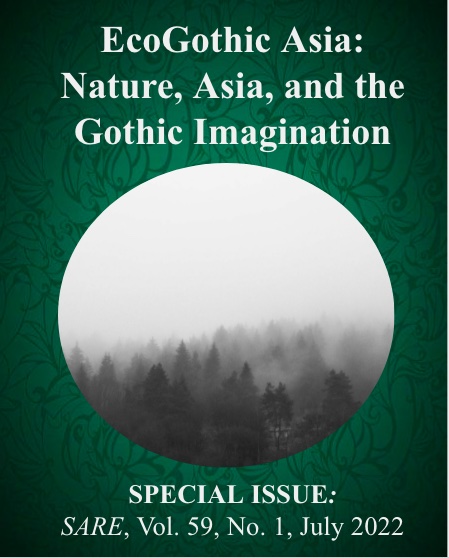Foliage and Fog: Uncanny Petrocultures in Tash Aw’s <i>We, the Survivors</i> and Helon Habila’s <i>Oil on Water</i>
DOI:
https://doi.org/10.22452/sare.vol59no1.3Keywords:
EcoGothic, Global South, petrofiction, Anthropocene, world literature, energy humanitiesAbstract
EcoGothic studies has, so far, primarily focused on uncanny environments imagined by Western writers. In response, this article compares polluted, haunting environments in two contemporary Anglophone novels from the Global South: Tash Aw’s We, the Survivors(2019) and HelonHabila’s Oil on Water(2011). Through vivid representations of the forbidding jungles of Malaysian palm oil plantations and the toxic waters of the oil-rich Niger Delta, both novels render extractive economies palpable and monstrous. This essay analyses how dystopian atmospheres, fragmented first-person narration, and circular crime fictions contribute to the EcoGothic aesthetic in both novels. Re-focusing scholarly attention from the dark woods of Europe and North America to the decaying mangroves across Asia and Africa foregrounds the ruinous aftermath of Western imperialism and neoliberal capitalism. By examining uncanny environments in Aw and Habila’s novels, this essay sheds new light on the neglected EcoGothic effects of Global South petrofiction.
Downloads
References
Works Cited
Aw, Tash. 2019.We, the Survivors. London: 4th Estate.Beckert, Sven. 2021. “Capital.”InAnna L.Tsing,Jennifer Deger, Alder Keleman Saxena, and Feifei Zhou, eds., Feral Atlas: The More-Than-Human Anthropocene.Redwood City: Stanford University Press.doi.org/10.21627/2020fa. Bello, Ismail, et al. 2017. “An Appraisal of Malaysia-Nigeria Foreign Economic Relations.”European Academic Research5.1: 1–16.Chan, Min Li. 2020. “On Language, Power, and Simply Making the Visible Visible: An Interview with Tash Aw.”TriQuarterly, www.triquarterly.org/interviews/language-power-and-simply-making-visible-visible-interview-tash-aw.Accessed 20 Jun. 2022.Deckard, Sharae. 2016. “‘Uncanny States’: Global EcoGothic and the World-Ecology in Rana Dasguptaʹs Tokyo Cancelled.”In Andrew Smith and William Hughes, eds., EcoGothic. Manchester: Manchester University Press.177–194.Deleuze, Gilles and Guattari, Félix. 1987. Brian Massumi, trans., AThousand Plateaus: Capitalism and Schizophrenia. London and Minneapolis: University of Minnesota Press.
Editors of Feral Atlas.2021.“Capital.”In Anna L.Tsing,Jennifer Deger, Alder Keleman Saxena, and Feifei Zhou, eds., Feral Atlas: The More-Than-Human Anthropocene.Redwood City: Stanford University Press.feralatlas.supdigital.org/world/capital?cd=true. Evaristo, Bernadine. 2010. “Oil on Waterby Helon Habila.”The Guardian. www.theguardian.com/books/2010/sep/25/oil-warter-helon-habila-review.Ghosh, Amitav. 1992. “Petrofiction: The Oil Encounter and the Novel.”The New Republic. 29–34.Habila, Helon. 2011.Oil on Water. London: Penguin.Hillard, Tom J. 2018. “‘Perverse Nature’: Anxieties of Animality and Environment in Charles Brockden Brown’s Edgar Huntley.”InDawn Keetley and Matthew Sivils, eds., Ecogothic in Nineteenth-Century American Literature. New York:Routledge.21–37.Ho, Karen. 2021. “Finance, Circa 1980s: The Acceleration of Extraction.”In Anna L.Tsing,Jennifer Deger, Alder Keleman Saxena, and Feifei Zhou, eds., Feral Atlas: The More-Than-Human Anthropocene.Redwood City: Stanford University Press.doi.org/10.21627/2020fa. LeMenager, Stephanie. 2014. “Introduction: Ultradeep, Petroleum Culture in the American Century.”Living Oil:Petroleum Culture in the American Century. Oxford: Oxford University Press.3-20.Lewis, Simon L., and Mark A. Maslin. 2015. “Defining the Anthropocene.” Nature519.7542:171–80. EBSCOhost, doi.org/10.1038/nature14258.Macdonald, Graeme. 2017. “‘Monstrous Transformer’: Petrofiction and World Literature.”Journal of Postcolonial Writing53.3:289–302. doi.org/10.1080/17449855.2017.1337680.Morton, Timothy.2007.Ecology without Nature: Rethinking Environmental Aesthetics. Cambridge, MA: Harvard University Press.Nixon, Rob. 2011. Slow Violence and the Environmentalism of the Poor. Cambridge, MA: Harvard University Press.“oil palm.”2021. EncyclopaediaBritannica.www.britannica.com/plant/oil-palm. Accessed 20 Jun. 2022.“Oil Production.”n.d. Nigerian National Petroleum Corporation.nnpcgroup.com/NNPC-Business/Upstream-Ventures/Pages/Oil-Production.aspx. Accessed 20 Jun. 2022.Pendakis, Andrew, and Ursula Biemann. 2012. “This Is Not a Pipeline: Thoughts on the Politico-Aesthetics of Oil.”Imaginations: Journal of Cross-Cultural Image Studies3:2:6–16.
Simoes, Alex, and Cesar A. Hidalgo. n.d. “Crude Petroleum in Malaysia.”OEC -The Observatory of Economic Complexity.oec.world/en/profile/bilateral-product/crude-petroleum/reporter/mys. Accessed 20 Jun. 2022.Smith, Andrew, and William Hughes. 2016. “Introduction: Defining the EcoGothic.”In Andrew Smith and William Hughes, eds., EcoGothic. Manchester: Manchester University Press. 1–14.“What Is Palm Oil? Facts About the Palm Oil Industry.”n.d. World Wildlife Fund.www.worldwildlife.org/industries/palm-oil. Accessed 20 Jun. 2022.
Downloads
Published
How to Cite
Issue
Section
License
Copyright (c) 2022 Jamie Uy

This work is licensed under a Creative Commons Attribution 4.0 International License.
Copyrights of all materials published in SARE are retained by the authors. Authors may republish their work or grant others permission to republish it. We would be grateful if republication is accompanied by an acknowledgment that the work was originally published in SARE.








